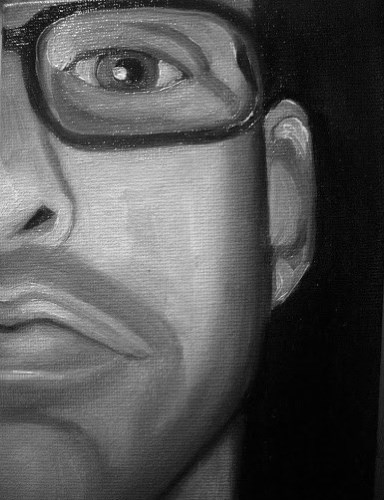"William Stobb has nerve, talent, and engages this madly accelerating, often nearly indecipherable world in what's called real time. And he manages it without sacrificing emotional force. That's something special." — August Kleinzahler, selecting Nervous Systems for the National Poetry Series
“Each poem in You Are Still Alive introduces itself with wistful, comic nihilism, but grows into a compassionate, fearless friend. It’s as though the reader had been dropped into the mind of a loving, funny, humble, infinitely generous, nimble-minded Buddhist monk brought up on classic science fiction. The monk’s musings honor the marvelous strangeness of each passing moment, never losing sight of the yawning maw of the dubious future. His contemplations are both heartening and sobering. The poems’ animated cosmic hospitality bring our greatest and smallest concerns into perfectly calibrated relation as they ponder consciousness, technology, freedom, the future, the worldly, how to lead a virtuous life without being an annoying prig, how flawed and destructive humans can be, how to be inventively fair-minded in at least five dimensions, and what life forms might come after us, stumbling on the ruins of our so-called civilization.” — Amy Gerstler
"Lit up even through the darkness of mortal disconnect, Nervous Systems charts the synaptic leap between peril and joy, the near rhyme of ruin and rain while William Stobb manages for us 'a party at his epicenter.' Deep-delved and thrown: 'ha ha time, ha ha vanishing point.' What a generous invitation. How could you miss it?" — Dean Young, on Nervous Systems
“There is a strange and elegantly accomplished serenity in the poetry of William Stobb: a serenity of tensions attenuated to their uttermost, of sinister imagery so deeply attended to and known that it becomes adorable. More than ever before, we need a poetry of hard peace. William Stobb, thank heaven, is writing it.” — Donald Revell
”The poems in You Are Still Alive by William Stobb are digressive and conversational, where detailed descriptions of the everyday and pop-cultural abound. Rather than this dissipating energy, however, Stobb uses the material to perform serious, nearly Buddhist thinking. Infused with elegiac hope, the poems hover on the cusp of an enlightened release of all worldly things—and a deep reluctance to give them up. Stobb proves that the profound exists in surprising places and that we may access thoughtfulness even when taking part in thoughtless tasks.” — Emily Wolahan, Colorado Review
“Stobb’s poems can be extremely personal and touching, while also alert and bewildered by the snap-fuzz-buzz of our present day—with its automation, distractions, prosthetics, and hyper-reality afforded to us from our venture into technology and innovation. It is a graceful marriage between brain and heart.” — Cody Todd
“The landscape [of William Stobb’s “Beep Boop”] is not the gently modulating elevations of peripatetic William Wordsworth’s Lake Country, but “the surplus auto yard,” . . . “the Creekside trail toward the closed-down / ice cream stand falling / over in long grass along the highway”—a description whose cadence seems to presage a James Wright-style epiphany never reached. We and the speaker (the “you” that includes us ) have insular reasons (“attractive TV doctor,” “immunity”) for moving. The poem zig-zags between perception and half-perceived possible transcendence:
Where the creek widens and meets the river
through branches over the bluff line
you notice the moon
setting in afternoon correction
of an idea as basic as night or day.
The daylight moon is recognized; vision “correction” is still possible. An idea can modify, and false separations disappear. The two lines that follow: “You are still alive. / Your thinking is not accurate” assert and deny possibility. (The first could have been written by James Wright, the second, never.)” — Angela Ball, The Best American Poetry blog
“The lyric pace of William Stobb’s prose seamlessly weaves each detail into a plot that’s both poignant and painful…. This is a story about bodies. Bodies that live, bodies that die, bodies that sleep, that swim, that kill, that are killed. Bodies don’t last forever. Life is tragic, short, and beautiful. This is a story to read and to remember. I won’t soon forget it.” — Jill Alexander Essbaum, selecting “All the Bodies” for the 2018 Zona Gale Fiction Award from the Council for Wisconsin Writers
“William Stobb’s work moves elegantly between restlessness and peace, an appreciation for the bizarreness of life and a desire for simplicity. In balancing these extremes, his poems create a feeling of movement toward reconciliation, if not its realization. To repurpose his own words, he builds a space “in which the emotional life/infected by the brightness of wit/puts its arm around the intellect.” This book is a rare and beautiful accomplishment.” — Bob Hicok
"Parable, ghost story, lyric, experimental novel, contemplation of history and death while filling the kiddie pool, all find thrillingly new formal play in the poems of William Stobb. Absentia does not shy from the erasures that trouble an attentive mind, but never has absence felt so rich with presences. Stobb writes with ease, wit, conversational jags, and deliciously terse eloquence. The vitality of these poems, the necessity of their questioning, makes life feel deep and strange and satisfying. I so admire this fine work as it quarries that most basic task of asking 'what the day/ requires and what the life.'“ — Alison Hawthorne Deming
“Performance artist, musician, and sculptor Laurie Anderson says: ‘Emptiness to me is expansive. And I don’t have to be there. I can’t exist in it.’ Stobb knows this emptiness, a vastness internalized. He is a poet of the desert. Just as Heizer’s work not only references the western landscape, but is made up of and by that landscape, Stobb takes the ‘inundated or eroded, extended or developed’ language and repositions it into lyric.” — Kelli Anne Noftle
